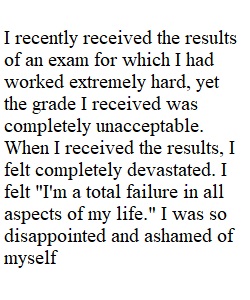


Q Assignment: Cognitive Behavioral Therapy: Re-Structuring Affect Using our Thoughts In this assignment, you are going to consider a time when you overreacted. The goal here is to learn ways to respond more skillfully, sensitively, and proportionately to events and people in our lives. Instructions 1) Think of a recent time you over-reacted to a situation. Don't include some major life event. Rather, think of some "dust-up," or some irking episode, which, upon reflection, is not that big a deal in the long run. Write down a very brief description of what transpired, and be sure to include the feelings you felt. 2) Now, take a look at the attached file. It describes a series of steps that some therapists use to help clients re-structure affect is that is disproportionate to a given event. Read over the whole document, and consider especially which of the irrational beliefs may pertain to you. 3) Next, create a catastrophe scale. It's easy. Draw a line, and mark 0, 25, 50, 75, and 100 on the line. Then, underneath the line, provide an example of an event that would consitute each score (a 25, a 50, a 75, and a 100). Now, events scoring a 100 are the worst events you can imagine. Events closer to 0 are events of little consequence (so little in fact, if you had not had an assignment like this, you may quickly forget they even happen). These are not events that actually have happened (they could be, but they don't have to be). Just consider, on your subjective scale of life's possible events, what would constitute for you a 25, a 50, a 75, and a 100 (or something approximating each of those numbers-- you can describe what a "15" is if you prefer, rather than a 25, for example. The idea here is to flesh out the relationship between types of events that could conceivably bring you stress. The handout attached here walks you through a version of this. 4) Now the fun part: think back to that event in step 1. On a scale of 1-100, with 100 being the worst thing ever, and with 1 being something so minor you may not have even noticed it, what score would you assign to that event IN THE MOMENT in which it occurred (so NOT what you would assign it now, in the cool light of rationality and distance, but rather what did it feel like in that moment in terms of a score)? Then, situate it where it truly should belong on the scale (e.g., it felt like a 73, but afterwards, like right now, it probably would only constitute a 10 on your scale). The objective is to see how events present in terms of feeling, and to see how they feel much later, with the idea being that it would sometimes really benefit us if we could "cognitively restructure" a disproportionate feeling in the moment to something much more warranting of its true score on our scale. 5) Some theorists argue that we often have an irrational belief somewhere in our internal schema, and that such beliefs are largely responsible for the disproportionate reaction. If we know what our "button" is, sometimes we can have more control over it (or our triggers) in moments of stress. Write a paragraph summarizing your irrational belief (the idea here is that we all have one, and that indeed it's typically the same irrational belief that triggers us again and again), and how it affected you in this instance, and what you might have told yourself instead, as a result of this exercise. Can you recall other times in your life when this irrational belief has reared its head? How did it affect you, and the subsequent situation? Please submit your answers in an MS Word doc, to this file folder.
View Related Questions